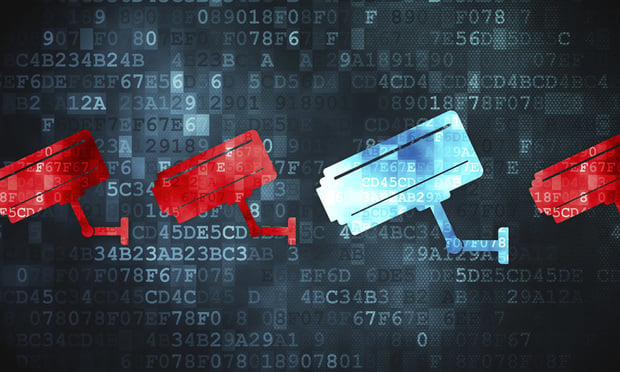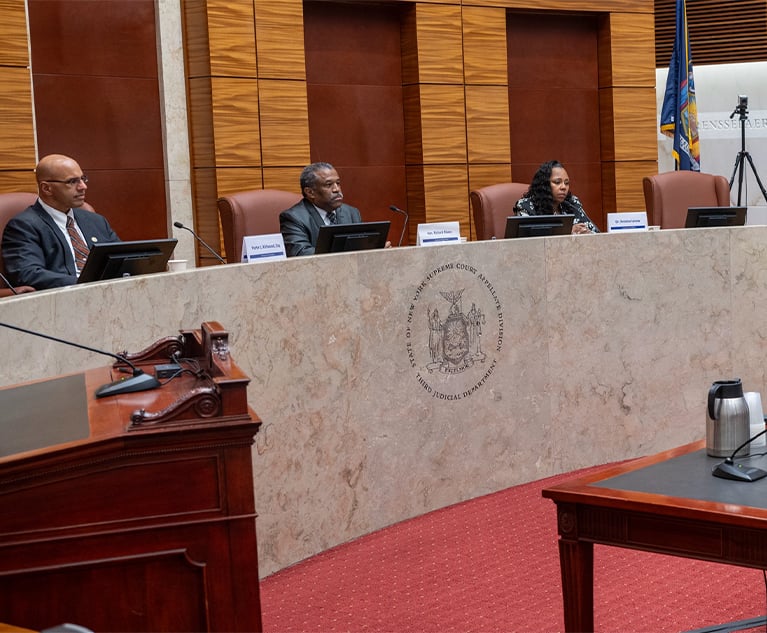2nd Circuit Revives Suit Over Staten Island Jail Conference Room Cameras
The city was granted a declaratory judgment in its favor by a Manhattan federal judge in February, who found the city had allayed Sixth Amendment concerns in protecting clients' communications with their attorneys.
December 03, 2018 at 03:48 PM
4 minute read

The U.S. Court of Appeals for the Second Circuit on Monday revived a lawsuit that claimed cameras placed in a Staten Island jail conference rooms violates attorney-client privilege protected under a 1999 settlement agreement.
The panel of Circuit Judges Rosemary Pooler, Raymond Lohier Jr. and Susan Carney remanded the case back to U.S. District Judge George Daniels of the Southern District of New York. The panel found Daniels had failed to analyze properly the terms of the agreement as it relates to Sixth Amendment concerns over conduct that chills detainees' communication with counsel.
The lawsuit stemmed from a decision by New York City officials to install cameras in conference rooms used by attorneys to talk with clients during the recent construction of a new court and detention facility in Staten Island.
Officials responded to the start of litigation over the cameras by looking for ways to mask the recording of a detainee in consultation with an attorney, including not recording audio. The plaintiffs in the underlying suit argued that the cameras represented a violation of an earlier settlement with the city over claims it wasn't providing appropriate private space for these sensitive meetings.
The district court found in favor of the city, noting that the settlement agreement did not expressly exclude the use of cameras that used the city's purported privacy fix. On appeal, the panel said while this was true, Daniels failed to engage in the proper balancing analysis in finding the settlement was not violated.
While the district court did engage in a form of the analysis, the panel found Daniels “misunderstood” important Sixth Amendment jurisprudence. Specifically, Daniels “erroneously concluded” that a detainee's belief that the conversation might still be recorded didn't constitute a recognizable burden on Constitutional protections. The district court did not appropriately consider the “chilling effect” the cameras presence has on detainees, the panel found.
“[T]he possibility that a pre-arraignment detainee could believe that the city is monitoring their communications and the consequent chilling effect of that belief must be considered in evaluating the alleged Sixth Amendment violation in this case,” the panel said, adding that the city's insistence that it wasn't monitoring the chats wasn't necessarily enough to allay chilling concerns.
The plaintiffs in the suit were represented on appeal by White & Case associate Colin West. In a statement, West said he and his clients were pleased with the decision, which he said appropriately recognized the potential impediment the cameras represented.
The Legal Aid Society joined White & Case on the appeal and was actively involved in the issue, working with the city on a potential settlement of the issue through early 2016. In a statement, Tina Luongo, attorney-in-charge of the organization's criminal practice, called the ruling a victory for due process.
“Our clients are entitled to meet with their attorneys in private—a fundamental part of the right to counsel,” she said. “We look forward to arguing the merits of this Sixth Amendment chilling effect on our client's right to speak freely with counsel, and call on the city to terminate this practice on Staten Island and elsewhere in the interim.”
A spokesman for the city's law department, Nicholas Paolucci, said in an email to the New York Law Journal, “We believe the current camera setup appropriately balances [Department of Correction]'s security concerns with detainees' Sixth Amendment rights, and that the district court will adhere to its determination that the DOC's use of the cameras complies with the law.“
Related:
State-of-the-Art Courthouse Opens on Staten Island
Legal Aid Sues to Remove Cameras in S.I. Courthouse
Judge Halts Continuous Video in Staten Island Courts
This content has been archived. It is available through our partners, LexisNexis® and Bloomberg Law.
To view this content, please continue to their sites.
Not a Lexis Subscriber?
Subscribe Now
Not a Bloomberg Law Subscriber?
Subscribe Now
NOT FOR REPRINT
© 2025 ALM Global, LLC, All Rights Reserved. Request academic re-use from www.copyright.com. All other uses, submit a request to [email protected]. For more information visit Asset & Logo Licensing.
You Might Like
View All

Law Firms Expand Scope of Immigration Expertise Amid Blitz of Trump Orders
6 minute read
'Reluctant to Trust'?: NY Courts Continue to Grapple With Complexities of Jury Diversity
Trending Stories
- 1Uber Files RICO Suit Against Plaintiff-Side Firms Alleging Fraudulent Injury Claims
- 2The Law Firm Disrupted: Scrutinizing the Elephant More Than the Mouse
- 3Inherent Diminished Value Damages Unavailable to 3rd-Party Claimants, Court Says
- 4Pa. Defense Firm Sued by Client Over Ex-Eagles Player's $43.5M Med Mal Win
- 5Losses Mount at Morris Manning, but Departing Ex-Chair Stays Bullish About His Old Firm's Future
Who Got The Work
J. Brugh Lower of Gibbons has entered an appearance for industrial equipment supplier Devco Corporation in a pending trademark infringement lawsuit. The suit, accusing the defendant of selling knock-off Graco products, was filed Dec. 18 in New Jersey District Court by Rivkin Radler on behalf of Graco Inc. and Graco Minnesota. The case, assigned to U.S. District Judge Zahid N. Quraishi, is 3:24-cv-11294, Graco Inc. et al v. Devco Corporation.
Who Got The Work
Rebecca Maller-Stein and Kent A. Yalowitz of Arnold & Porter Kaye Scholer have entered their appearances for Hanaco Venture Capital and its executives, Lior Prosor and David Frankel, in a pending securities lawsuit. The action, filed on Dec. 24 in New York Southern District Court by Zell, Aron & Co. on behalf of Goldeneye Advisors, accuses the defendants of negligently and fraudulently managing the plaintiff's $1 million investment. The case, assigned to U.S. District Judge Vernon S. Broderick, is 1:24-cv-09918, Goldeneye Advisors, LLC v. Hanaco Venture Capital, Ltd. et al.
Who Got The Work
Attorneys from A&O Shearman has stepped in as defense counsel for Toronto-Dominion Bank and other defendants in a pending securities class action. The suit, filed Dec. 11 in New York Southern District Court by Bleichmar Fonti & Auld, accuses the defendants of concealing the bank's 'pervasive' deficiencies in regards to its compliance with the Bank Secrecy Act and the quality of its anti-money laundering controls. The case, assigned to U.S. District Judge Arun Subramanian, is 1:24-cv-09445, Gonzalez v. The Toronto-Dominion Bank et al.
Who Got The Work
Crown Castle International, a Pennsylvania company providing shared communications infrastructure, has turned to Luke D. Wolf of Gordon Rees Scully Mansukhani to fend off a pending breach-of-contract lawsuit. The court action, filed Nov. 25 in Michigan Eastern District Court by Hooper Hathaway PC on behalf of The Town Residences LLC, accuses Crown Castle of failing to transfer approximately $30,000 in utility payments from T-Mobile in breach of a roof-top lease and assignment agreement. The case, assigned to U.S. District Judge Susan K. Declercq, is 2:24-cv-13131, The Town Residences LLC v. T-Mobile US, Inc. et al.
Who Got The Work
Wilfred P. Coronato and Daniel M. Schwartz of McCarter & English have stepped in as defense counsel to Electrolux Home Products Inc. in a pending product liability lawsuit. The court action, filed Nov. 26 in New York Eastern District Court by Poulos Lopiccolo PC and Nagel Rice LLP on behalf of David Stern, alleges that the defendant's refrigerators’ drawers and shelving repeatedly break and fall apart within months after purchase. The case, assigned to U.S. District Judge Joan M. Azrack, is 2:24-cv-08204, Stern v. Electrolux Home Products, Inc.
Featured Firms
Law Offices of Gary Martin Hays & Associates, P.C.
(470) 294-1674
Law Offices of Mark E. Salomone
(857) 444-6468
Smith & Hassler
(713) 739-1250







